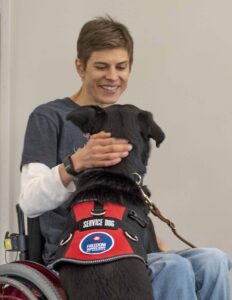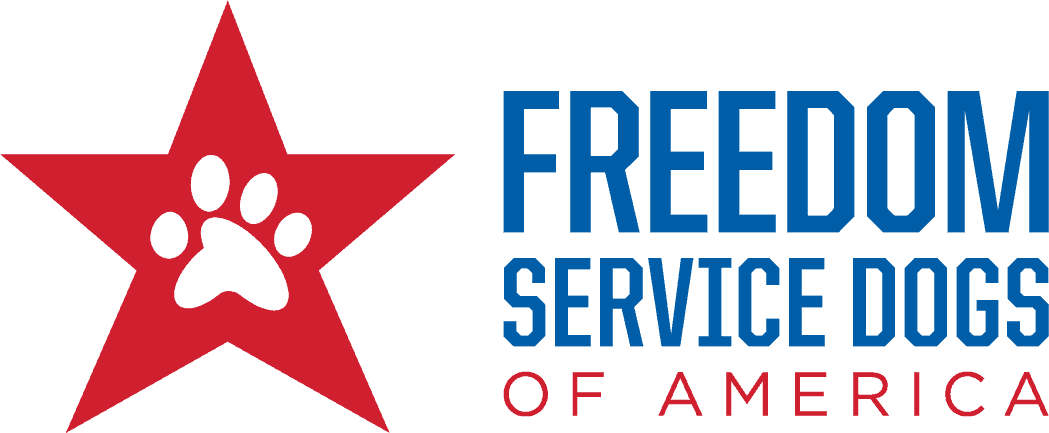“A Team” joins FSD staff
Amanda and Ava bring helpful perspective from client’s viewpoint

You may recall reading about Amanda Vallo and her service dog, Ava—affectionately known as the “A-Team”—in our January Pupdate. Amanda, who was partially paralyzed in a car accident 25 years ago, graduated with Ava in December 2018—but that milestone was just the start of their FSD story.
In mid-March, Amanda joined our staff as client services manager, a role in which she combines her expertise as a licensed professional counselor with her real-life experience as an individual with mobility disabilities and an FSD client.
In her new position, Amanda leads the Client Services team that also includes a veteran services coordinator and a client services coordinator. The team is responsible for the 100-plus clients on FSD’s waiting list, as well as our almost 250 active clients. As such, they communicate with clients-in-waiting and manage their cases, organize match meetings between clients and service dogs, and field requests for ongoing support from existing clients, among other duties.
After graduating from FSD last winter, Amanda—who lived in Overland Park, Kansas, at the time—was planning a move to Ohio to be closer to her family. When she heard about the opening for a client services manager at FSD, she thought it sounded like a good fit but knew it would be a huge change for her in every way. “I wanted to be part of a team again, and it felt so good to know that the people at FSD really wanted me to join them. So I decided to do something new rather than re-create an old story.”
Because of her personal history and counseling career, Amanda is in a unique position to relate to FSD clients. “I bring a perspective to FSD that offers breadth to our vision, along with the insights of someone with a disability who has a service dog. I can identify with our clients as they’re being matched with dogs and going through placement class, and get an honest feel for where they’re at.”

Amanda’s first-hand experience with Ava also allows her to give clients a realistic sense of what it means to have a service dog. “Ava is my first-ever dog,” she says, “and I don’t think I really understood what that requires. I live in an apartment without a yard, so when Ava needs to go outside at 8 o’clock at night and it’s 10 degrees outside, it doesn’t matter if I don’t feel like it; I have to take her out.”
Amanda says that learning to be a service dog handler requires people to make adjustments. “You have to change some of your habits and routines, and in my case, I now have to think for two rather than just one. You have to show up for the struggles and challenges you weren’t expecting. And since a service dog isn’t just a pet, you have the added responsibility of enhancing the dog’s life, which is another whole level of care and investment. Ava has skills that people have invested time in, so it’s up to me to keep them fresh and give her challenges so she can continue to develop. We’re teammates, and I have to create the conditions for her to succeed.”
Because Amanda’s spinal cord injury occurred 25 years ago, she has had time to go through the many phases of learning to live with a disability. “At first, you’re just in the trenches, focusing on your physical accomplishments and trying to balance reality and hope. Then at some point, you realize you’re never going to be your old self. You’re different, but it doesn’t have to be bad different. Ava is allowing me to mature and grow and align with my current values. I get to rewrite my life from here forward.”
Contact Erin Conley at econley@

